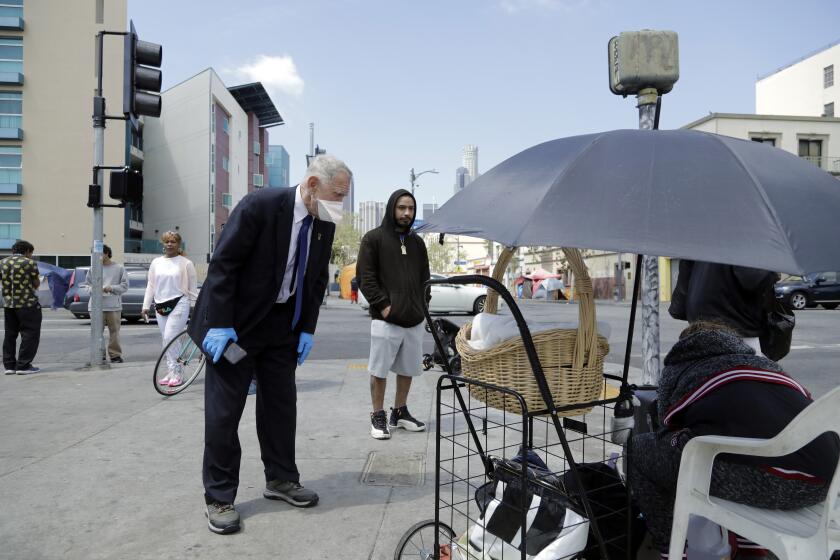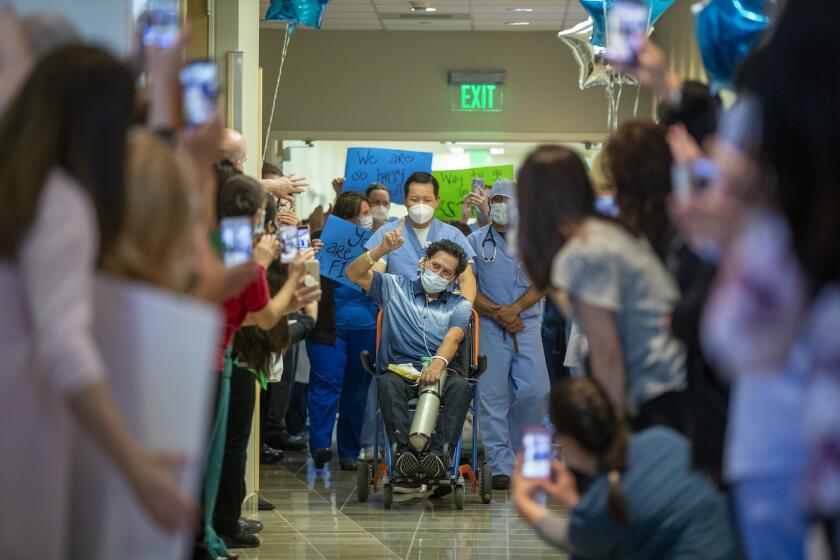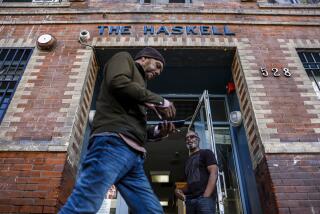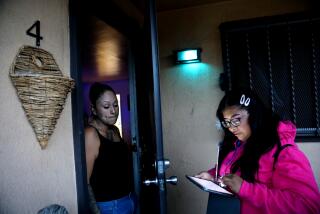L.A. races to save 15,000 homeless people from coronavirus — one hotel room at a time
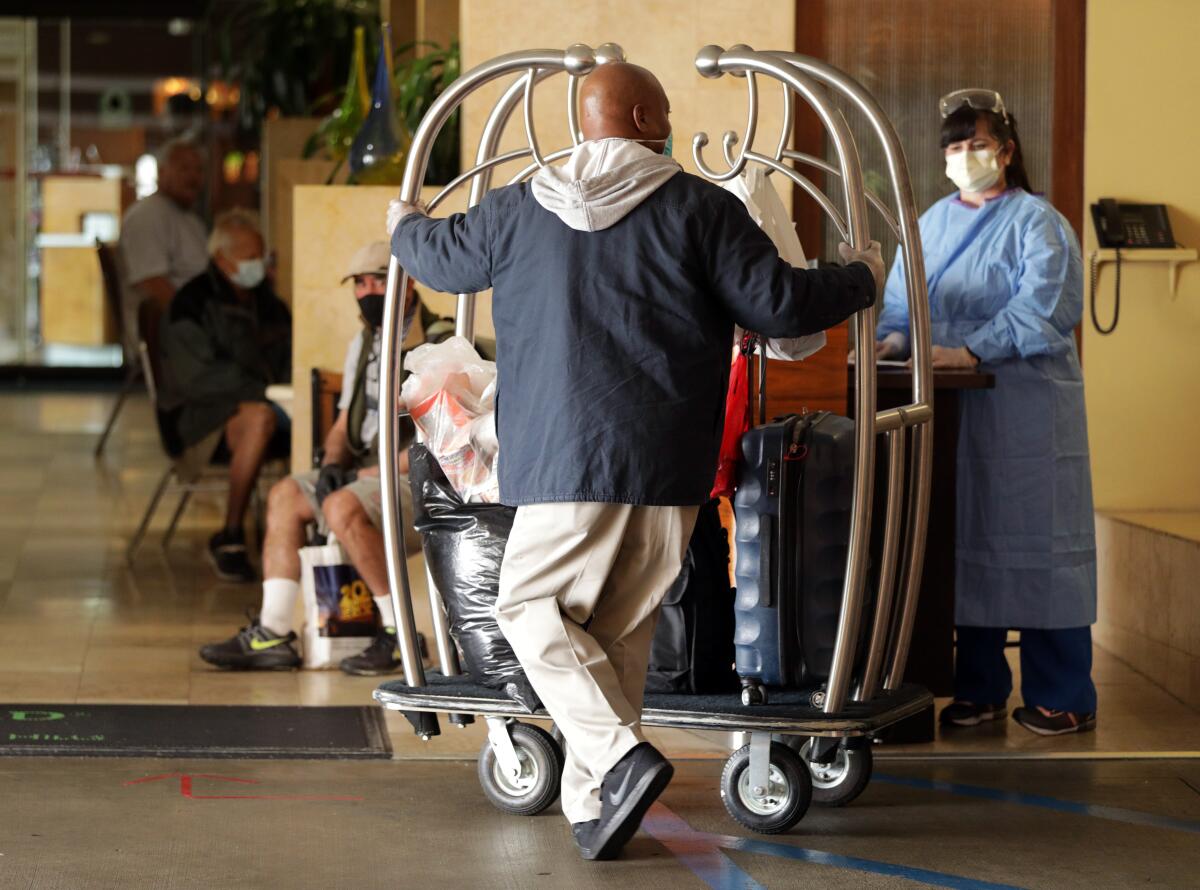
Hoping to prevent a surge of deadly coronavirus cases in the homeless community, Los Angeles officials have launched a new effort to move an unprecedented 15,000 people out of overcrowded shelters and encampments and into hotel rooms.
It’s a daunting goal, given that nearly 60,000 people live without permanent shelter in L.A. County, most of them sleeping in the streets each night. Getting every person into an emergency shelter or a hotel room is probably an impossible task.
But in recent weeks, city and county officials, guided by the Los Angeles Homeless Services Authority, settled on the smaller number of 15,000 because it accounts for the segment of the homeless population most likely to die on the streets — with or without the pandemic. Those who are seniors and are medically fragile.
“We’re in a race to save lives,” said Sarah Dusseault, chairwoman of the Los Angeles Homeless Services Authority’s oversight commission. “Our thought is that every person who is taken to a hotel room is one less person possibly sick and one less person using hospital resources.”
The state has set its own goal of leasing 15,000 hotel and motel rooms for homeless people.
Moving quickly is critical. If LAHSA can secure 15,000 rooms and fill them, it could prevent 1,400 hospitalizations and 350 deaths, according to an analysis by Randall Kuhn, the UCLA researcher who led a study on how many homeless people could die from COVID-19. But that’s only if it happens before there’s an outbreak in the homeless population, and there already have been several cases reported on skid row, prompting Mayor Eric Garcetti to announce additional aid on Friday.
So far, LAHSA is only housing only 766 homeless people in 12 hotels. That’s in addition to separate efforts to house hundreds of people in converted recreation centers and at a tent camp for veterans in West Los Angeles.
It’s a minuscule beginning. To protect all of the homeless people who are most likely to die if the coronavirus strikes encampments, LAHSA would have to multiply its portfolio by as many as 200 hotels.
Still, even if the effort, known as Project Roomkey, is only moderately successful, it will be transformational for Los Angeles, Dusseault said.
At 76, Judge David Carter knows he shouldn’t be on skid row exposing himself to the coronavirus. But he wants more for L.A.’s homeless people.
She sees it as a turning point in L.A.’s relationship with its homeless population. It would move more homeless people off the streets than ever before, and she said LAHSA is determined to ensure that they won’t be sent back after the immediate threat of the coronavirus passes.
“We are not going back to the status quo,” Dusseault said.
In the first few weeks of Project Roomkey, which was created by Gov. Gavin Newsom but is being implemented at the local level, the county has been working with state negotiators to sign deals with hundreds of hotel owners. LAHSA then brings in staff, and signs contracts for food service, mental health resources, security and transportation.
Unlike in other cities and counties, where opposition from elected officials, hotel owners and the public have stifled plans for homeless housing, all the major players in Los Angeles are on board. Hotels have opened smoothly in half a dozen small cities, although there has been some resistance in Lawndale and Bell Gardens.
On Saturday, Gov. Gavin Newsom acknowledged those obstacles at the local level, but also said that so far, counties implementing Project Roomkey across the state have secured 10,974 hotel and motel rooms for homeless people and that 4,211 — about 38% — are occupied.
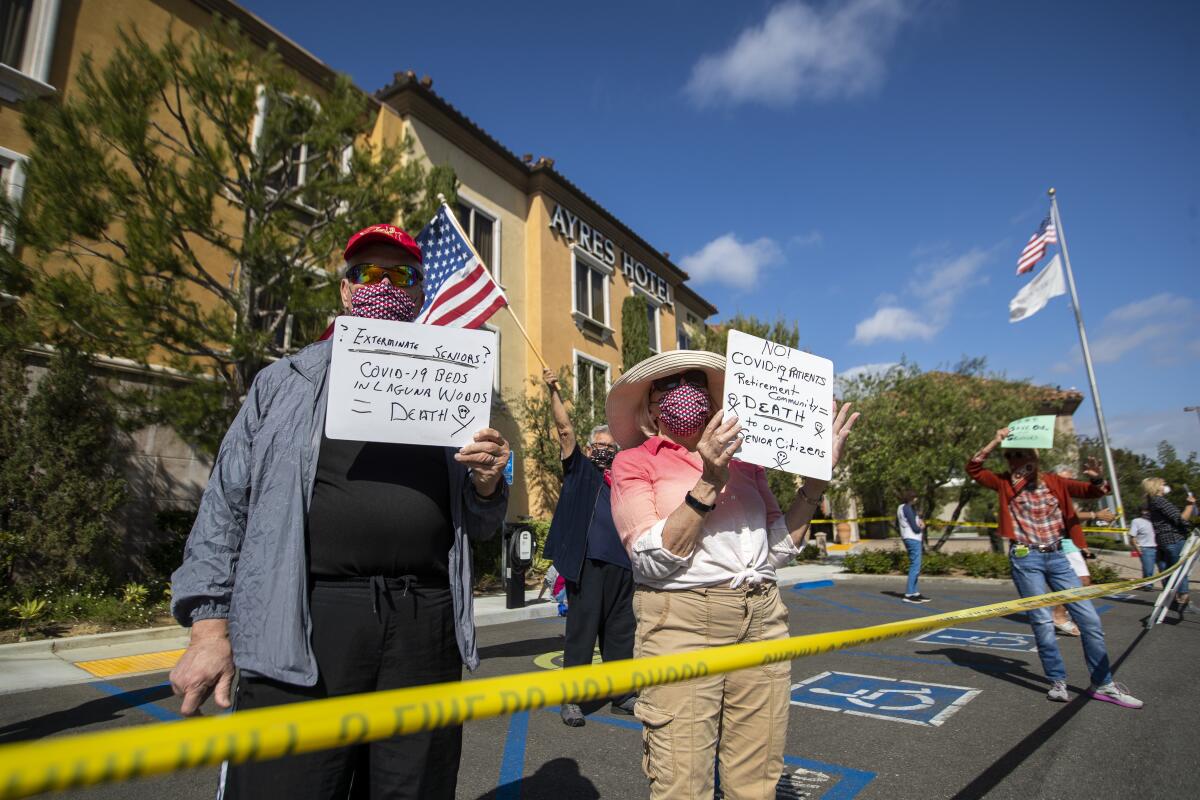
The Hotel Assn. of Los Angeles, contacted by the county for help, has turned over a list of 270 hotels with 25,000 rooms whose owners are willing to participate.
“This is extraordinary and unprecedented,” said Phil Ansell, head of the county’s Homeless Initiative, which is handing the hotels off to LAHSA to operate as shelters.
Funding for the $190-million effort is largely secure through a Federal Emergency Management Agency commitment to reimburse 75% of the per-room cost. But timing is another matter.
Speaking at a forum last week, county Supervisor Mark Ridley-Thomas set an aggressive deadline. “Quickly stated, our goal is 15,000 hotel rooms across the county by April 26,” he said. It’s likely to take much longer, though.
Fifteen state and county negotiators, working mostly from home, have been closing leases on about 150 rooms per day — a pace that would not allow L.A. to reach its goal until sometime in summer, potentially long after the peak of coronavirus cases.
To speed things up, LAHSA created a streamlined system to get sites running once a hotel becomes available. Using emergency authority, the agency’s interim executive director, Heidi Marston, bypassed the normal bidding process to select contractors for food service, security and nursing.
With outreach and case management staffs beefed up from three years of funding from Measure H, they were ready, said Stephanie Klasky-Gamer, president and chief executive officer of North Hollywood-based LA Family Housing.
LA Family Housing, which was already providing services at a county-operated quarantine site for all patients in North Hollywood, took responsibility for motels in Canoga Park and Reseda with a total of 126 rooms. But Klasky-Gamer said she deferred to her partner agency, Bridge to Home, to run the new motel in Santa Clarita.
Venice-based St. Joseph Center committed 19 staff members to open a 136-room Westside hotel and is preparing to take on more.
“That we’re able to step up and do this is tremendous,” said Va Lecia Adams Kellum, president and chief executive officer. “We do whatever it takes. I’m sending emails at night saying, ‘You know anybody looking for work?’ ”
There’s no shortage of demand for the rooms. The first eight sites filled to near capacity within about three days.
Marston said about half of the homeless residents came from other shelters that needed to reduce bed counts to allow for more social distancing, or met the vulnerability criteria for age and health. The other half came directly from the streets. LAHSA is developing a call center to take referrals from hospitals and other sources.
Marston said she cannot predict how long it will take to fill 15,000 rooms and isn’t working under a deadline.
These are some of the unusual new scenes across the Southland during the coronavirus outbreak.
“We’re going to keep pushing until we’re told to stop pushing or run out of money or resources,” she said.
Until now, the biggest bottleneck has been getting hotels through the leasing process. The county’s target room rate of $85 doesn’t get hotel owners out of the red, said Heather Rozman, executive director of the Hotel Assn. of Los Angeles. But considering that the alternative is no money, price hasn’t proved to be a sticking point, said David Howard, the county’s assistant chief executive officer who is in charge of the team of state and county negotiators.
Howard said the negotiators are competing with another county agency that is seeking 2,000 rooms for medical isolation and quarantine, and other groups that are recruiting hotels to provide rooms for first responders and medical personnel who become infected.
Issues that can slow talks include how much of the hotel staff will remain in place — usually housekeeping, janitorial and administrative staff at reduced levels but not kitchen staff — and how owners will be insured for damage.
Additional delays of days or weeks can follow once the leases are in place. Some hotels are being renovated or still have paying guests. As of Monday, 2,464 rooms were under lease, but fewer than half of those were ready for people to move in. There has also been backpedaling. Five hotels that the county listed as being under lease dropped out over insurance and other issues, lowering the room total by more than 300.
Securing large hotels downtown, close to skid row where the need is greatest, so far has eluded the negotiators. Garcetti said in his Friday address that he was expecting a large downtown deal to be announced in the coming days.
“We hope to see the pace of progress accelerate,” Howard said.
The timing is crucial. The sooner people can move indoors, with daily meals, bathrooms, medical screening and supervision, the fewer will die, Kuhn said. The professor in the UCLA Fielding School of Health calculated that for every 11 homeless people housed, one hospitalization will be avoided. And for every 42 people housed, one death would be prevented.
Each hospitalization averted has the potential to save other lives by providing access to overstretched hospitals.
Dusseault, who spends her days at home preparing welcome baskets for the new homeless guests, is confident there will be a surge in hotel leasing when deals are reached with one or two large hotels or an owner of several smaller properties.
Marston and Dusseault are both already zeroed in on the exit plan, determined that any gains made during the pandemic must not be lost when it is over by sending people back to the streets.
Avoiding that outcome will take “thinking really big,” Marston said.
More shelters will have to be opened in existing buildings and empty land will have to be turned into shelter space and for permanent housing with modular projects. Some hotel or motel owners also might be willing to enter long-term leases, they said.
“I want to see conversations happening that are city, county and even state,” Marston said.
